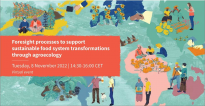22 November 2022, from 14:30 to 16:00 CET How far are we in the agroecological transition? The contribution of the Tool for Agroecology Performance Evaluation (TAPE)
The webinar was co-chaired by the Animal Production and Health Division (NSA) and Plant Production and Protection Division (NSP), two FAO divisions in charge of the development of TAPE. Remi Cluset, Agroecology Advisor at NSP, gave an overview of the TAPE mandate, the development process as well as the objectives of the tool. Dario Lucantoni, a Livestock and Agroecology Specialist at NSA, presented the progress to date and gave an overview of the results on a global scale. Preliminary results and examples of analysis were given by Anne Mottet, a Livestock Development Officer at NSA, and Frank Escobar, a consultant on Agroecology policies at NSP highlighted the links with local context and policies.
The second session focused on practical insights generated from the implementation of TAPE in four different countries. Alejandro Marengo and Mauro Casselo from INSITU (Instituto de Intervenciones Situadas) gave insights on how they implemented TAPE in Argentina and specifically on the participatory component they included in the process to evaluate and interpret the results for the generation of policy recommendations. Anina Gilgen and Lutz Merbold from Agroscope talked about how they included a further component to TAPE to assess the biodiversity component more in-depth. Furthermore, Salia Hebie from ARFA (Association for Research and Training in Agroecology) shared his experience with using TAPE to analyze agrosilvipastoral systems in Burkina-Faso while Rada Kong from ASSET (Agroecology and Safe Food Systems Transitions in South East Asia) illustrated practical issues and first results from a study which applied TAPE to assess four different agroecosystems in Cambodia.
The webinar highlighted how the growing community of practice for TAPE is generating a multitude of evidence and insights, thereby contributing to the further development and application of this tool.
Related:
The main objective of the virtual event was to share key findings from an ongoing stocktaking exercise on how foresight initiatives support sustainable food system transformations, including through agroecological approaches. It will also enable multi-disciplinary and collective discussions to highlight key recommendations on the use of foresight exercises to facilitate agroecological transitions that could be relevant at different levels and contexts. The event will bring together a wide variety of stakeholders, including decision-makers, farmer organizations, private sector, civil society organizations, foresight practitioners, agroecology practitioners and public authorities.
This event was co-organized by the Food and Agriculture Organization of the United Nations (FAO), the French Agricultural Research and International Cooperation Organization (CIRAD) and the Deutsche Gesellschaft für Internationale Zusammenarbeit (GIZ).
- Robin Bourgeois, Senior Researcher, CIRAD. Welcoming remarks and introduction
- Ronnie Brathwaite, Team Leader, Ecosystem Approach to Crop Production Intensification Unit, Plant Production and Protection Division, FAO. Building sustainable food systems through agroecology,
- Ingrid Prem, Project Manager, Sustainable Agriculture, Rural Development Agriculture, Food Security, GIZ. Agroecology in GIZ: lessons learned and challenges
- Marie de Lattre-Gasquet, Senior Researcher, CIRAD. Key features of foresight for agroecological transitions and main recommendations,
Interactive panel discussion:
- Jim Woodhill, Senior Consultant, Foresight4Food Initiative.
- Lorenzo Giovanni Bellù, Senior Economist, Agrifood Economics Division, FAO.
- Molly Anderson, Member, International Panel of Experts in Sustainable Food Systems IPES-Food.
- Esther Penunia, Secretary General, Asian Farmers’ Association for Sustainable Rural Development and Interim Coordinator of the Agroecology Coalition.
- Marisa Fogante and Marcos Filardi, Advisers at the National Directorate of Agroecology, Ministry of Agriculture, Livestock and Fisheries, Argentina
- Anne-Sophie Poisot, Agricultural Officer, Pest and Pesticide Management Unit, Plant Production and Protection Division, FAO Concluding remarks


No comments:
Post a Comment